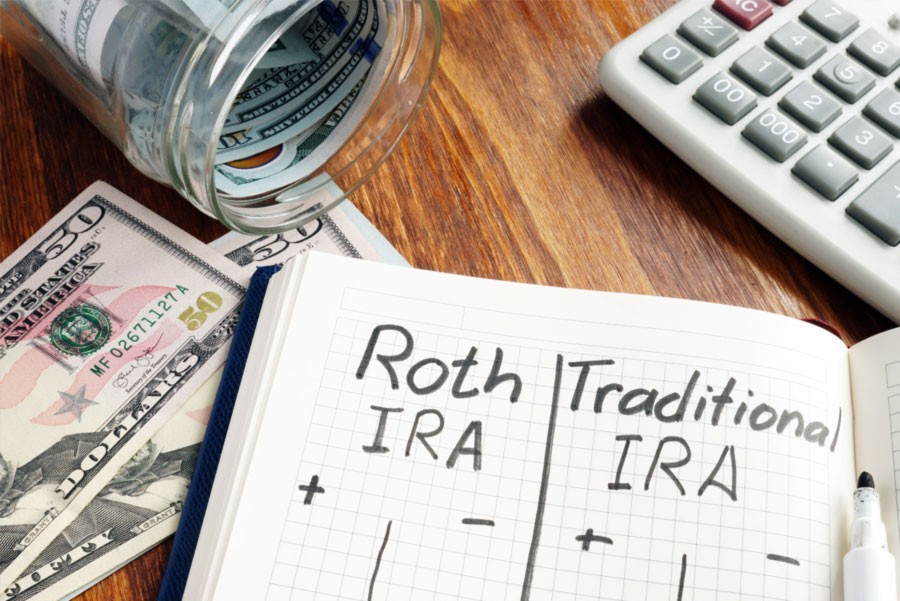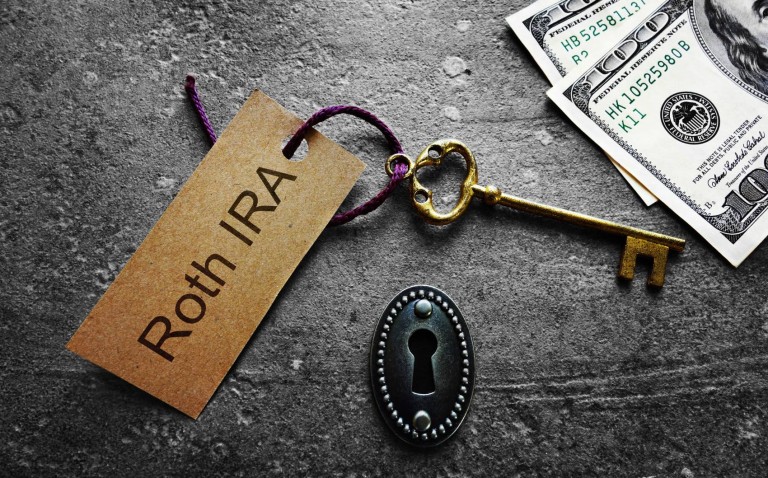Many people have a 401(k) plan with their employer at work, but not everyone has a Roth IRA. While they are two different types of investments with unique eligibility requirements, financial guidelines, and tax rules, they aren’t mutually exclusive. Both Roth IRA investments and 401(k) accounts can help you save for retirement and reach your long-term financial goals. So, as many people continue to ask, can you have a Roth IRA and a 401(k)? The short answer is yes, you can have both. Here, we’ll delve into information on Roth IRA and 401(k) plans, how to contribute to both throughout the year, and which one is better for individual circumstances.
Understanding a Roth IRA
A Roth IRA is a type of individual retirement account (IRA). They’re very similar to traditional IRAs, with the biggest difference being how the invested money is taxed. Traditional IRA deposits are made using money taken out of your income before taxes, which lowers your overall taxable income for that year. While you do get a tax deduction on a certain portion of this money, you will need to pay income tax once the money is withdrawn. With a Roth IRA, you pay taxes on the money you invest, making them non-tax-deductible. However, when you go to withdraw the money that’s been compounding in your Roth IRA, you can do so tax-free.
Benefits
The biggest benefit to utilizing a Roth IRA, especially when compared to traditional IRAs and a 401(k), is the tax-free withdrawal. This can substantially increase your retirement savings and allow you to plan more effectively over the years. Roth IRA plans are also beneficial because you can diversify your investment portfolio for the long run based on risk and overall performance. The benefits of utilizing a Roth IRA to fund your children’s college tuition is that it allows your investment to grow tax-free over the years. If your child chooses not to attend college, you can use the funds for retirement.
Drawbacks
While the benefits are worth investing, there are limitations. For one, the amount of money you can contribute to a Roth IRA is substantially lower than what you can contribute to a 401(k). Roth IRA contributions are capped at $6,000 per year—$7,000 per year if you’re 50 or older.
Understanding a 401(k)
A 401(k) plan is another type of retirement account that works to provide company-sponsored tax benefits through long-term contributions and growth. It’s commonly offered by employers to their employees with different internal regulations. Some companies provide matching benefits to long-term employees, and many make contributions easy with automatic withholding. The money that’s invested into 401(k) plans is not taxed until the money is withdrawn. This allows employees to reduce their overall taxable income for the year of the contribution, thus providing a degree of tax benefits. 401(k) plans are also known as defined-contribution plans, where the primary percentage of contributions come from the employee or owner of the account. This is important to understand as traditional pensions work in the opposite manner, where the contributions come from the employer after retirement.
Benefits
There are a lot of benefits of contributing to a 401(k) plan through your employer. The biggest benefit occurs if your company offers contribution matching. Some companies pledge to match 100% of the employee’s contributions, while others offer smaller percentages that may grow as the years pass. If your company offers matching, always use that to the fullest degree. If you don’t, you’re missing out on free money. Another benefit is the higher contribution levels. As of 2021, you can contribute up to $19,500 in your 401(k). This number can increase to $26,000 for those that are 50 or older. This cap does not include employer matched contributions, but always double check with your employer to avoid penalties.
Drawbacks
One of the drawbacks of using a 401(k) is that the investments are more limited. You will only get to choose your investment opportunities based on what your company provides. This can result in a smaller selection, higher fees, and varying degrees of risk. When you decide to take money out of your 401(k), you will need to pay taxes on the withdrawn amount. Withdrawing money early from a 401(k) can also result in higher penalties.
Contributing to Both a Roth IRA and a 401(k)
If you’re looking to make the biggest impact on your retirement savings and get the most out of your investments, you can contribute to both a Roth IRA and a 401(k). Having one does not affect your contribution limits for another and if you can max out both of your plans, you’ll be well prepared for a successful retirement. If you want, you can also rollover your 401(k) to an IRA.
Roth IRA or 401(k): Which is Better?
While many people hope to be able to contribute to both plans, it’s not as feasible as you think. A majority of people cannot max out their plans and therefore, want to know which plan is better: a Roth IRA or a 401(k). The answer varies. It depends on several factors such as employer matching, taxable income, and more. Neither retirement account is better than the other at face value. Instead, it depends on your individual circumstances. With that being said, if your employer offers matching contributions, always utilize that first. Employers tend to cap their contributions at a percentage of employee salary, so contribute until you reach the cap. This essentially gives you free money without impacting the amount of money you can contribute over the course of a year. If you reach the cap of employer match, then you’ll need to decide which plan to contribute to. If your 401(k) plan doesn’t have a lot of investment options, a Roth IRA may be better for your goals.
To make sure that you’re getting the most out of your retirement planning—regardless of if you have a Roth IRA, a 401(k), or both—work with an experienced financial advisor like William Bevins. William Bevins is experienced in both individual retirement planning and employer sponsored retirement plans, resulting in the understanding and experience you need to create a successful financial future. Contact us today to learn more or to book a free consultation.
Roth IRA or 401(k): Which is Better?
While many people hope to be able to contribute to both plans, it’s not as feasible as you think. A majority of people cannot max out their plans and therefore, want to know which plan is better: a Roth IRA or a 401(k). The answer varies. It depends on several factors such as employer matching, taxable income, and more. Neither retirement account is better than the other at face value. Instead, it depends on your individual circumstances. With that being said, if your employer offers matching contributions, always utilize that first. Employers tend to cap their contributions at a percentage of employee salary, so contribute until you reach the cap. This essentially gives you free money without impacting the amount of money you can contribute over the course of a year. If you reach the cap of employer match, then you’ll need to decide which plan to contribute to. If your 401(k) plan doesn’t have a lot of investment options, a Roth IRA may be better for your goals. To make sure that you’re getting the most out of your retirement planning—regardless of if you have a Roth IRA, a 401(k), or both—work with an experienced financial advisor like William Bevins. William Bevins is experienced in both individual retirement planning and employer sponsored retirement plans, resulting in the understanding and experience you need to create a successful financial future. Contact us today to learn more or to book a free consultation.




